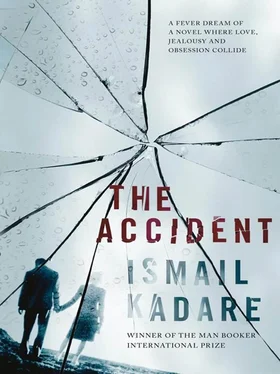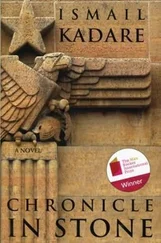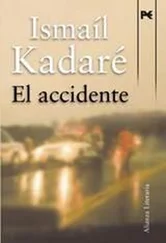Incredible, she thought again, climbing back into bed. He was still sleeping as if nothing had happened. Just like one thousand years ago, she lay down beside him.
Chapter Eleven
The next day. Morning.
He had no right to behave like this. She spent most of her mornings alone, and he should have been beside her on this one. Even before she opened her eyes, her bare arm groped for him, but he wasn’t there. Drowsily, she stretched her arm further, to the edge of the bed. Beyond lay Austria and the plains of Europe. The names of great cities glowed palely like on old wireless sets, fraught with terror. He shouldn’t do this. Inevitably he would be the first to go, leaving her alone in this world for many long years. So he shouldn’t be in a hurry now.
Finally she opened her eyes. The waking world was in order. It was simple and obvious: he had gone for a walk through the pine trees while waiting for her to wake up. Scraps of daylight filtered awkwardly through the shutters. The little burgundy Cervantes lay there inert, weary of its old secret.
She heard steps and the door handle turned. He bent down to kiss her temple. He was carrying the morning papers. Over breakfast, he glanced through the headlines.
“The queen is ill,” Rovena said.
He said nothing.
She set aside her coffee cup and phoned home. “Mother, I’m in Durrës with my girlfriends. Don’t be worried.”
The coffee struck Besfort as particularly good. How sweet this world could be, with queens ill and women telling white lies.
“Look at this,” Rovena said, handing him a newspaper.
Besfort laughed, and read aloud, “‘Baroness Fatime Gurthi, spokesperson of the Tirana Water Board, attempted to justify the water shortage.’ Buying titles is the latest fashion. A thousand dollars, and you wake up a count or a marquis.”
“I thought it was a joke, but even in jest it makes no sense.”
Besfort replied that it was no joke. There were international agencies that trafficked titles. Everybody in the former East was crazy about them.
“That’s all we need,” said Rovena.
Besfort was sure he had the business card of a certain Viscount Shabë Dulaku (Reinforced Doors and Windows Made To Order) from the suburb of Lapraka. He’d heard of a duke in the traffic police and a countess who had written a booklet entitled Albanian Irregular Verbs .
After breakfast they went out for a walk along the shore. A fierce wind blew, and it seemed an alien, indifferent kind of day. Clinging tightly to his arm, Rovena felt her hair strike Besfort’s face.
She did not know whether she was still supposed to tell him everything that was on her mind or not. She had the impression that the eyes of both of them had become as hard as glass in the wind. Even if she wanted to, she wouldn’t be able to admit everything, not even to herself.
Behind iron railings, the swimming pools were frozen. Films of ice like cataracts spread over the surface of the water.
They found a restaurant for lunch and then spent the whole afternoon locked in their room. In bed, before they made love, he caressed her and whispered something about Liza. He had forgotten all the little details, or pretended to have done. She replied to him in the same whisper. He told her that nobody understood men like she did. Rovena flattered him in the same way.
As dusk fell Rovena spoke to her mother again on the phone while Besfort switched on the television to see if there was news of the Queen. “It’s lovely here, Mother. We’re going to stay tonight too.”
As she spoke, he stroked her belly, tracing circles around her navel.
Evening deepened fast. As midnight approached, the roaring of the sea sounded increasingly plangent. In the morning they left the hotel in a hurry, not knowing themselves why they felt so flustered. As they drove towards Tirana, the traffic grew heavier. There seemed to be more florists than ever at the crossroads leading to the western cemetery. We all get flowers sooner or later, thought Rovena. She remembered scraps of their conversation about the bogus conspirators. Some of them must be buried here. They would have flowers like everybody else.
At the entrance to Tirana the line of vehicles was barely moving. A traffic policeman walked past their car and Besfort asked him if there had been an accident. The policeman glanced at their licence plate out of the corner of his eye before he answered.
“The queen is dead,” he said.
Besfort switched on the radio and they heard the queen mentioned. But the voices were raised in anger. They were arguing. By the time they reached Kavaja Street it became clear what it was all about: the funeral ceremony and also the site of her grave. The government, as always, was caught on the wrong foot.
“Just wait, they’ll appeal to some commission in Brussels next,” said Rovena.
Near Skenderbeg Square they heard a statement from the Royal Court. A requiem for the queen would be sung at St. Paul’s Cathedral at three o’clock that afternoon. No word about the burial site. The government had still not issued a ruling about the restitution of the king’s property, including the family graves, in the south-east of the capital.
They had almost reached Rovena’s house when the radio broadcast a second statement from the court. The place of burial was still undecided.
“This is scandalous,” Rovena said, opening the car door.
On his way back, Besfort wanted to take the street past the cathedral, but it was cordoned off. After an announcement that the parliament would convene for an emergency session early in the afternoon, the radio carried interviews with ordinary passers-by. “This is a disgrace, a total disgrace,” said one anonymous citizen. “To begrudge a patch of land for the queen’s grave, it’s crazy.” – “And you, sir?” – “I don’t know much about these things. I think we should follow the law. The law should hold good for the wife of the king or the president as for everybody else.” – “Are you alluding to the dictator’s widow?” – “What? No, no. Don’t get me mixed up in that sort of thing. I was talking about the queen and other serious issues, not about that old witch.”
The radio interrupted the interviews to announce that a third statement from the Royal Court was imminent.
Chapter Twelve
The Hague. The last forty days.
For a long time there was no evidence that Besfort Y., and still less both of them, had been in The Hague forty days before the end of the story. In fact, indications that they were in Denmark on that day seemed to eliminate the slightest suspicion of such a thing. Rovena’s friend in Switzerland, usually cautious in her testimony, was certain of it: Rovena had phoned from the train just after crossing the Danish border. Jottings in Rovena’s notebook, made four days before, supplied further evidence of her intended journey. “Jutland. Saxo Grammaticus. Villages where the events of Hamlet (Amleth) took place… Two-day visit.”
In fact, suspicions regarding The Hague had taken root immediately after the reported exclamation “I’ll see you both in The Hague”, uttered by Rovena’s intimate friend Liza.
There was no supporting evidence for a visit to The Hague from travel tickets or hotel registrations. The convincing alibi of Denmark also nearly banished this suspicion as quickly as it had arisen. This trip was like one of those imaginary journeys that take place in the minds of would-be travellers, or, in the case of The Hague, in the minds of those who are keen to see someone in the dock. However, a few lines in the diary of Janek B., Rovena’s Slovak classmate and casual lover, mentioned again the fateful destination of The Hague. In this diary was a brief and obscure description of a nightmare in which the dreamer saw pieces of white paper announcing apartments for sale stuck on telephone poles, but from a distance looking like a summons to the Hague Tribunal.
Читать дальше












